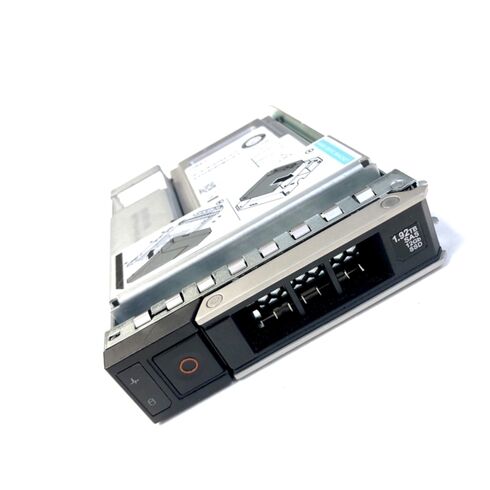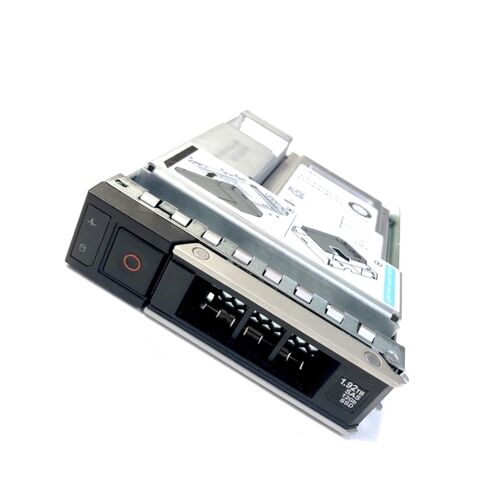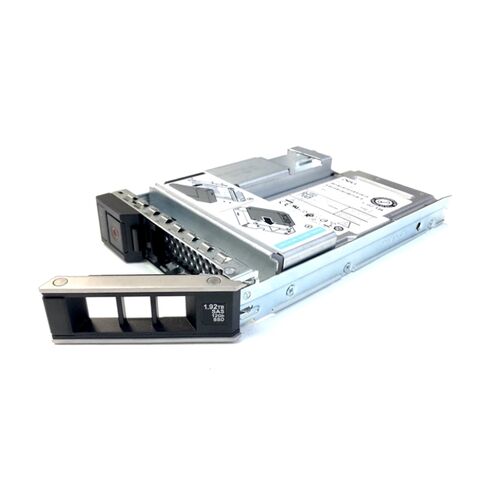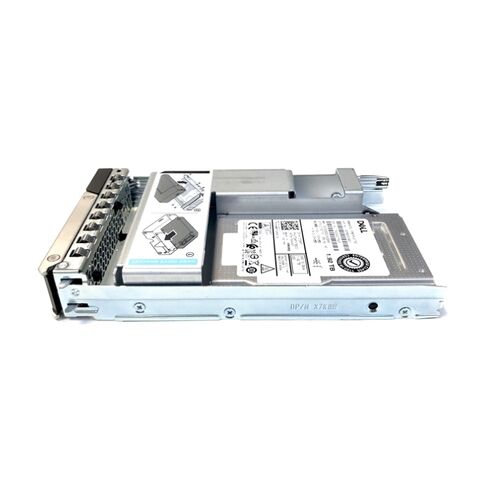400-AZBQ Dell 1.92TB SAS 12GBPS Hybrid Carrier Hot-plug SSD
- — Free Ground Shipping
- — Min. 6-month Replacement Warranty
- — Genuine/Authentic Products
- — Easy Return and Exchange
- — Different Payment Methods
- — Best Price
- — We Guarantee Price Matching
- — Tax-Exempt Facilities
- — 24/7 Live Chat, Phone Support
- — Visa, MasterCard, Discover, and Amex
- — JCB, Diners Club, UnionPay
- — PayPal, ACH/Bank Transfer (11% Off)
- — Apple Pay, Amazon Pay, Google Pay
- — Buy Now, Pay Later - Affirm, Afterpay
- — GOV/EDU/Institutions PO's Accepted
- — Invoices
- — Deliver Anywhere
- — Express Delivery in the USA and Worldwide
- — Ship to -APO -FPO
- — For USA - Free Ground Shipping
- — Worldwide - from $30
Product Overview
Explore the Dell 1.92TB SAS 12Gbps Read Intensive Solid State Drive (SSD), designed for enhanced performance and reliability. This DELL Certified SSD features a 3.5-inch hybrid carrier, making it ideal for use in 14G, 15G, and 16G PowerEdge servers.
General Information
- Manufacturer: Dell
- Part Number: 400-AZBQ
Technical Specifications
Drive Details
- Type: Internal Solid State Drive
- Storage Capacity: 1.92TB
- NAND Flash Memory: V-NAND TLC
- Form Factor: 2.5 inches x 15mm SFF
- Interface: SAS 12Gb/s
- Endurance Class: Read Intensive
- SSD Endurance (DWPD): 1 DWPD
Performance Metrics
- Sequential Read Speed: Up to 4,150 MB/s
- Sequential Write Speed: Up to 2,450 MB/s
- Random Read IOPS: 595,000 IOPS
- Random Write IOPS: 155,000 IOPS
Compatibility Information
Supported PowerEdge Servers
- PowerEdge C6600
- PowerEdge C6620
- PowerEdge MX760c
- PowerEdge R440
- PowerEdge R450
- PowerEdge R550
- PowerEdge R650
- PowerEdge R6515
- PowerEdge R660
- PowerEdge R6615
- PowerEdge R6625
- PowerEdge R740
- PowerEdge R740xd
- PowerEdge R750
- PowerEdge R750xa
- PowerEdge R750xs
- PowerEdge R7515
- PowerEdge R760
- PowerEdge R7615
- PowerEdge R7625
- PowerEdge R940
- PowerEdge T550
Endurance: Read-intensive
The Dell 1.92TB Read-intensive Endurance TLC SAS 12GBPS Hybrid Carrier Hot-plug SSD is designed to deliver exceptional performance and reliability for read-intensive workloads. With its read-focused endurance, this SSD is optimized for applications that require faster access to data and frequent read operations.
Benefits of Read-intensive Endurance
Read-intensive endurance SSDs offer several key benefits for users:
1. Enhanced Read Performance
One of the primary advantages of read-intensive SSDs is their ability to deliver superior read performance. These drives are optimized to handle large volumes of read requests quickly and efficiently, resulting in faster data access times. This is particularly beneficial for applications that rely heavily on reading data, such as web servers, content delivery networks, and data analytics platforms.
2. Improved Data Availability
By prioritizing read operations, read-intensive SSDs ensure that data is readily available when needed. This is crucial in scenarios where instant access to critical information is essential for business operations. With faster read speeds, users can retrieve data promptly, minimizing latency and reducing potential bottlenecks.
3. Extended Lifespan
Read-intensive SSDs are engineered to withstand heavy read workloads over an extended period. These drives are designed with advanced endurance features, such as wear-leveling algorithms and over-provisioning, which distribute the workload evenly across the drive and prevent excessive wear on specific cells. This results in improved longevity and reliability, making them ideal for applications with high read demands.
Importance of Read-intensive Endurance
The importance of read-intensive endurance becomes evident in various scenarios:
1. Data-Intensive Applications
Read-intensive SSDs are particularly valuable in data-intensive applications that require rapid access to vast amounts of information. These applications include big data analytics, real-time data processing, and content delivery networks. By prioritizing read operations, these SSDs ensure that data can be retrieved quickly, enabling faster decision-making and improved user experiences.
2. Virtualized Environments
In virtualized environments, multiple virtual machines (VMs) often access shared storage simultaneously. With read-intensive SSDs, VMs can access the necessary data faster, reducing latency and improving overall performance. This is especially critical in virtual desktop infrastructure (VDI) setups, where users rely on quick access to their virtual desktops and applications.
3. Database Servers
Database servers heavily rely on read operations to retrieve requested data. By utilizing read-intensive SSDs, organizations can enhance the performance and responsiveness of their database systems. This is particularly beneficial for online transaction processing (OLTP) databases that handle high volumes of concurrent read requests.
Interface: SAS 12GBPS
The Dell 1.92TB Read-intensive Endurance TLC SAS 12GBPS Hybrid Carrier Hot-plug SSD features an SAS (Serial Attached SCSI) 12GBPS interface. This high-speed interface offers numerous benefits for users requiring fast and reliable data transfer capabilities.
Benefits of SAS 12GBPS Interface
The SAS 12GBPS interface provides several advantages for users:
1. Increased Bandwidth
The SAS 12GBPS interface offers significantly higher bandwidth compared to previous generations of SAS interfaces. With a maximum transfer rate of 12 gigabits per second, this interface enables faster data transfers between the SSD and the host system. This is particularly beneficial for applications that involve large file transfers, such as video editing, data backup, and content creation.
2. Enhanced Scalability
The SAS 12GBPS interface supports multiple devices connected in a daisy-chain configuration, allowing for increased scalability. This feature is essential in environments that require the expansion of storage capacity without compromising performance. By simply adding more SAS devices to the chain, users can easily scale their storage infrastructure to accommodate growing data demands.
3. Improved Reliability
SAS interfaces are renowned for their robustness and reliability. The SAS 12GBPS interface maintains this reputation by offering advanced error detection and correction mechanisms, ensuring data integrity during transmission. Moreover, SAS drives feature dual-port connectivity, allowing for redundant paths to the storage system. This redundancy minimizes the risk of data loss or downtime in case of a single point of failure.
Importance of SAS 12GBPS Interface
The importance of the SAS 12GBPS interface becomes evident in various scenarios:
1. High-Performance Computing
In high-performance computing (HPC) environments, where large-scale simulations and data-intensive applications are common, fast and reliable data transfer is crucial. The SAS 12GBPS interface enables HPC clusters to efficiently process and exchange data between nodes, maximizing overall system performance.
2. Enterprise Storage Systems
Enterprise storage systems demand high levels of performance, scalability, and reliability to support critical business operations. The SAS 12GBPS interface meets these requirements by providing fast and reliable connectivity between storage devices and servers. This ensures that enterprise storage systems can handle heavy workloads, deliver consistent performance, and maintain data availability.
3. Data Centers
Data centers require robust storage solutions that can meet the demands of multiple servers and applications. The SAS 12GBPS interface allows data center administrators to build highly efficient and scalable storage architectures. By utilizing SAS drives with 12GBPS interfaces, data centers can ensure fast data access, minimize latency, and improve overall responsiveness.
Capacity: 1.92TB
The Dell 1.92TB Read-intensive Endurance TLC SAS 12GBPS Hybrid Carrier Hot-plug SSD offers a generous capacity of 1.92TB. This ample storage space enables users to store large amounts of data, applications, and files without worrying about running out of space.
Benefits of 1.92TB Capacity
The 1.92TB capacity delivers several benefits for users:
1. Ample Storage Space
A significant advantage of the 1.92TB capacity is the abundance of storage space it provides. This allows users to store extensive datasets, media files, software applications, and other digital assets without the need for additional storage devices. With ample space, users can keep their data organized and easily accessible.
2. Simplified Storage Management
By offering a larger capacity, the 1.92TB SSD reduces the complexity associated with managing multiple storage devices. Users can consolidate their data onto a single drive, simplifying backup and recovery processes. This streamlined storage management approach saves time and effort while ensuring data integrity.
3. Scalability and Future-Proofing
The 1.92TB capacity allows for future scalability and growth without immediate concerns about running out of storage space. As data requirements increase over time, having a higher-capacity SSD ensures that users can accommodate expanding storage needs without the need for frequent hardware upgrades. This scalability and future-proofing capability translate into cost savings and improved efficiency.
Importance of 1.92TB Capacity
The importance of the 1.92TB capacity becomes evident in various scenarios:
1. Media Production
Professionals in media production, such as video editors, graphic designers, and animators, often work with large file sizes that require ample storage space. The 1.92TB capacity enables them to store their projects, source files, and media assets conveniently on a single SSD, eliminating the need for multiple storage devices.
2. Data Backup and Archiving
Data backup and archiving processes involve storing vast amounts of data for extended periods. The 1.92TB capacity provides ample room for backing up critical data and creating long-term archives. This ensures that businesses can safeguard their valuable information while maintaining easy accessibility whenever needed.
3. Virtualization
In virtualized environments, the ability to store multiple virtual machines (VMs) on a single SSD is crucial for efficient resource utilization. The 1.92TB capacity allows organizations to host a significant number of VMs on a single drive, simplifying management and improving overall performance.
Form Factor: Hybrid Carrier Hot-plug
The Dell 1.92TB Read-intensive Endurance TLC SAS 12GBPS Hybrid Carrier Hot-plug SSD features a hybrid carrier hot-plug form factor. This form factor offers unique benefits in terms of flexibility, ease of installation, and hot-swapping capabilities.
Benefits of Hybrid Carrier Hot-plug Form Factor
The hybrid carrier hot-plug form factor provides several advantages for users:
1. Versatility and Compatibility
The hybrid carrier hot plug form factor is designed to fit into various server and storage enclosures seamlessly. Its standardized dimensions ensure compatibility with a wide range of systems, allowing users to easily integrate the SSD into their existing infrastructure. This versatility is particularly valuable in multi-vendor environments or when upgrading existing storage systems.
2. Easy Installation and Replacement
The hot plug capability of the hybrid carrier allows for easy installation and replacement of the SSD without shutting down the entire system. This feature simplifies maintenance and upgrades, as drives can be added or removed while the system is operational. This minimizes downtime and ensures continuous data availability.
3. Efficient Cooling and Heat Dissipation
The hybrid carrier design incorporates efficient cooling mechanisms to dissipate heat generated during SSD operation effectively. This ensures that the drive remains within optimal temperature ranges, reducing the risk of performance degradation or premature failure. By maintaining proper cooling, the hybrid carrier hot-plug form factor enhances the overall reliability and lifespan of the SSD.
Importance of Hybrid Carrier Hot-plug Form Factor
The importance of the hybrid carrier hot-plug form factor becomes evident in various scenarios:
1. Enterprise Data Centers
In large-scale data center environments, efficient management, maintenance, and scalability are vital. The hybrid carrier hot-plug form factor allows data center administrators to add or replace drives quickly without disrupting operations. This feature is especially valuable in mission-critical applications that require high availability and minimal service interruptions.
2. Cloud Computing
In cloud computing infrastructures, where virtualization and resource pooling are prevalent, the ability to hot-swap drives provides significant advantages. The hybrid carrier hot plug form factor facilitates seamless drive replacements and upgrades without impacting the overall service quality or interrupting customer operations. This enables cloud service providers to deliver uninterrupted services and maintain high customer satisfaction.
3. High-Availability Systems
High-availability systems, such as fault-tolerant servers and storage clusters, require continuous operation and rapid recovery in case of component failures. The hybrid carrier hot-plug form factor allows for quick replacement of failed drives, minimizing downtime and ensuring that critical systems remain operational. This feature is crucial in industries where uninterrupted operations are essential, such as finance, healthcare, and telecommunications.













